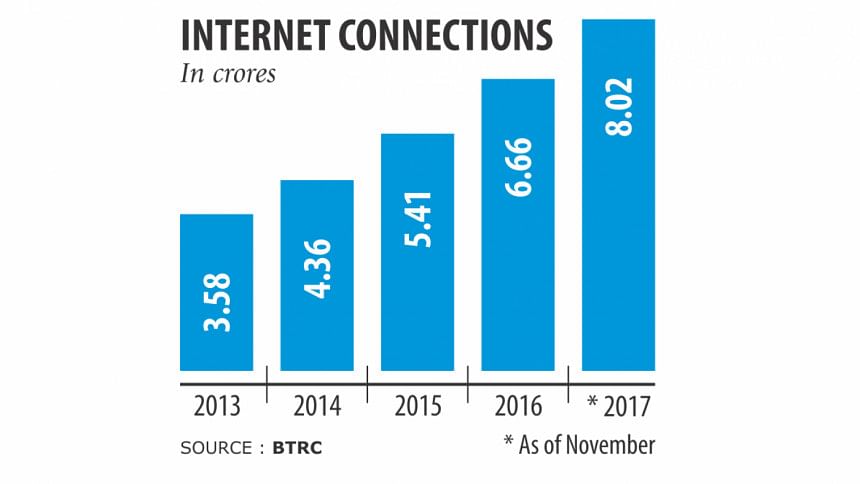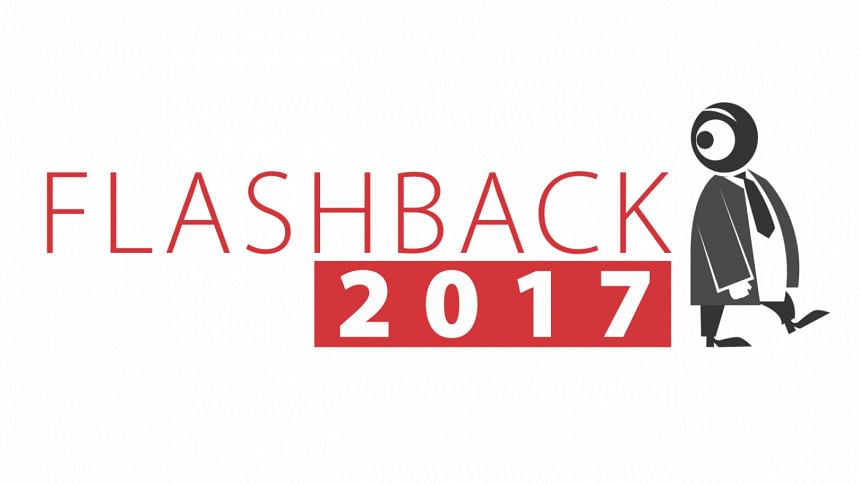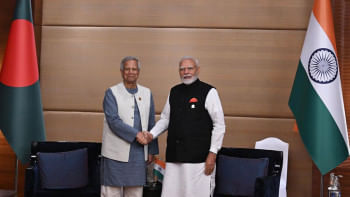A stellar year for ICT

Bangladesh's ICT sector will bid farewell to 2017 on a high note as the year saw digital services thrive, exports hit a new peak and local companies go global.
Experts and entrepreneurs termed the passing year as 'dynamic' as the whole digital ecosystem progressed to the next level.
"In 2017, we observed that lots of new business windows have opened up banking on the digital platform," said Yasir Azman, deputy chief executive officer of Grameenphone.
Some of them began operations in 2016 but got momentum this year; 2018 will only take the narrative forward for them.

The massive strides were only possible because of the political stability and youth engagement, said Azman, who is also the chief marketing officer of the country's leading mobile phone operator.
The telecom industry acquired 1.35 crore active internet connections in the first eleven months, while the mobile operators added 1.67 crore active SIMs into their network, according to Bangladesh Telecommunication Regulatory Commission.
At the end of 2016, the consumption of internet bandwidth was about 380 gigabits per second. Last week, it hit 540 Gbps, said industry experts.
In another achievement, the BTRC also finalised a certification process for setting up mobile assembling plants in the country.
Two local firms -- Walton and Symphony -- have set up plants, with Walton already marketing its locally-assembled products.
Some other companies, including foreign brands, are watching the developments with keen interest, as in the budget for fiscal 2016-17 the government slashed the customs duty for mobile components meant for local assembling by 36 percentage points to 1 percent. At the same time, it doubled the customs duty on handset import to 10 percent.
"Within the next couple of years, Bangladesh can present itself as a device manufacturing country," said Rezwanul Haque, chief executive officer of Transsion Bangladesh, a sister concern of Chinese mobile phone manufacturer Transsion Holdings.
Transsion has recently decided to set up a mobile assembly plant in Gazipur next year.
Smartphone sales though have slowed in 2017 after a few years of stellar growth, according to Haque, who is the immediate past secretary general of Bangladesh Mobile Phone Importers' Association.
Importers had planned to bring in 1.10 crore units this year, but the final tally might be 95 lakh, up from 82 lakh in 2016, according to Haque.
"The increase in customs duty has affected the industry to some extent," he added.
However, laptop imports soared 60 percent this year to five lakh units.
In the outgoing year, Bangladesh got its second submarine cable, although the full benefits of the heightened connectivity are yet to be reaped.
The government's allocation of nearly Tk 13,000 crore for the ICT sector is one of the key achievements for the year, said Shameem Ahsan, chairman of eGeneration Group, a leading management consultancy, technology services and outsourcing firm.
"We hope, in 2018 Bangladesh will not only be known as a low-cost solutions provider but also as one of the leaders in providing innovative solutions and in specialising in cutting-edge technologies," he added.
Export earnings from locally-made software and ICT-related services like outsourcing and freelancing hit $800 million in 2017, said State Minister for ICT Zunaid Ahmed Palak recently.
"Our next target is to cross the $1 billion mark by next year and we are on the right track," Palak added.
And giving more hope to this goal is the inauguration of the Sheikh Hasina Software Technology Park in Jessore in the second week of December.
The year also saw a number of Bangladeshi companies strengthen their global footprint.
Datasoft Systems made its foray into the topical business of Internet of Things, winning the commission to build 10,000 smart homes in Tokyo.
They also signed an agreement with the Democratic Republic of Congo to install IoT-based toll management solution for its Matadi Bridge.
In January, Dohatec New Media, another Bangladeshi software developer, set off to establish Bhutan's electronic government procurement system.
Tiger IT, another Bangladeshi firm, opened a factory in Kathmandu to manufacture digital registration plates for the Himalayan country.
Though a couple of ride-hailing mobile apps hit the road in 2016 they got momentum in the outgoing year, said Elius Hussain, CEO of Pathao, which got five lakh registered users in 2017.
Global ride-hailing giant Uber scored 15 lakh registered users from Dhaka in 2017 alone.
E-commerce also passed another good year, with customers taking various services from their mobile devices.
In the outgoing year, the government also completed the arrangements for the launch of the country's first communications satellite Bangabandhu-1. The satellite might be thrown into the orbit by April.
The awarding of the mobile number portability licence is another milestone for the telecom ministry.
The service, which is expected to be rolled out by April, will allow mobile phone users to switch to any operator without changing their existing eleven-digit number.
The government also ironed out all niggles for the much-delayed rollout of the fourth generation of broadband cellular network technology, which would succeed the existing 3G technology.
The BTRC will hold the spectrum auction on February 13, and it will take another couple of months for the service to be rolled out.
There were also some upsets for the ICT industry during the year. US-based consultancy firm Accenture left the country in November and Ericsson scaled back on its operations.
TIM Nurul Kabir, secretary general of the Association of Mobile Telecom Operators of Bangladesh, pointed out that some of the legacy challenges that are hindering the growth of the sector still remain unresolved.
AMTOB hopes all the impediments will be resolved in the coming year and the telecom sector will contribute more to the economy.

 For all latest news, follow The Daily Star's Google News channel.
For all latest news, follow The Daily Star's Google News channel. 



Comments